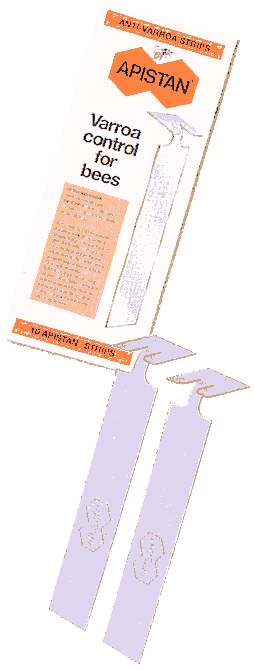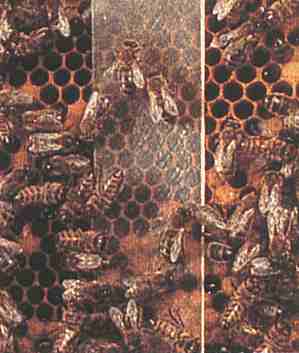Chemical Treatments
Apistan Resistance Test
Wang's Manpulik Strips
|
|
|
|---|
|
Chemical Treatments Apistan Resistance Test Wang's Manpulik Strips |
Apistan... Anti Varroa Strips, Varroa control for bees |
|---|

|
General note on chemicals: I do not endorse or advise on chemical treatments, as I am not qualified to do so and there may be dangers beyond my control. New products may be introduced or existing ones withdrawn, so it is difficult to keep up with current information on a website such as this. As many of the chemical pages were generated by Dave Cushman, I am leaving the content mainly as left by Dave for historical purposes only, which may mean information is out of date and unreliable. The user should seek guidance from other sources and satisfy themselves regarding safety and legality. Roger Patterson.
Licence holder Data Sheet Ref:- 1188/99, Date of Issue of Data:- thought to be 1999
Presentation... 10 polymer beehive strips. Each 8g
(+/-0.8g) strip containing 824mg tau-fluvalinate.
Uses
Method of Application... The strips are bonded together in one sheet. To separate them, hold firmly at corner (see illustration 1), near top and pull along scored line from top to bottom. Replace the unused strips in the original package. |
|---|

APISTAN* strips are suspended in the brood chamber (hive body) in such a way that the bees can walk on both sides of the strips. To suspend the strips between the frames, twist out the wings of each strip (see Illustration 2).
Dosage instruction... Hives the size of National, Dadant, Langstroth etc., require two strips per brood chamber. For example, in the case of a Dadant 10 frame hive, one strip is suspended between frames 3 and 4, and the second strip between frames 7 and 8 within the brood chamber. Small hives and nuclei require only 1 strip suspended near the centre of the brood chamber. Do not place strips in the honey supers.
 The Apistan strips are not in any way repugnant to the bees
as can be seen in the picture at left.
The Apistan strips are not in any way repugnant to the bees
as can be seen in the picture at left.
Duration of use... Treatment duration is 6-8 weeks after which time the strips are removed and disposed of. The strips should not be removed from the hive for at least 6 weeks. Do not leave the strips in the hive for more than 8 weeks. The treatment period should be kept as short as possible in order to reduce the likelihood of trace residues in the brood wax and to avoid the development of mite resistance. If signs of disease persist or appear consult your veterinary surgeon or veterinary practitioner.
STORAGE & DISPOSAL... Keep out of reach of children.
Keep strips in original, unopened, packaging until ready to use.
Store below 25 deg C away from direct sunlight in original packaging only.
Do not store strips near pesticides or other chemical substances which
could contaminate the strips.
Replace any unused strips in the original packaging.
Store away from foodstuffs.
Use strips for one treatment only; do not re-use strips.
Dispose of
used strips safely by wrapping in paper and placing in domestic
refuse.
Do not contaminate ponds or streams with product.
PRECAUTIONARY STATEMENTS
Wear gloves when handling APISTAN* strips. Avoid contact
with skin, mouth and eyes. Wash hands thoroughly with soap and water
after handling strips.
Do not smoke, drink or eat during application.
Waiting period... Nil.
Legal Category... GSL, FOR ANIMAL TREATMENT ONLY.
Product Licence No Vm 17017/4000
Batch No: and Expiry date: See Side of pouch
*... APISTAN is a registered trademark of Vita (Europe) Ltd UK.
I neither endorse nor condemn this product. The information as published here is a matter of public record. The information is placed here for the education of those that wish to read it. BEFORE you obtain or use the material concerned please ascertain the legality of doing so in your location as the product may or may not be approved in your geographic State or Country.
The pictures for this page have been taken from Vita leaflets and instruction sheets.
PLEASE NOTE... there are differences between the Apistan product detailed here and that which is available in USA from a different manufacturer. Please consult that manufacturer for their instructions. They are available at:- www.apistan.com
Dave Cushman.
Originally written by Dave Cushman. Edited and additions by Roger Patterson.
Page created Spring 2001
Page updated 12/12/2022